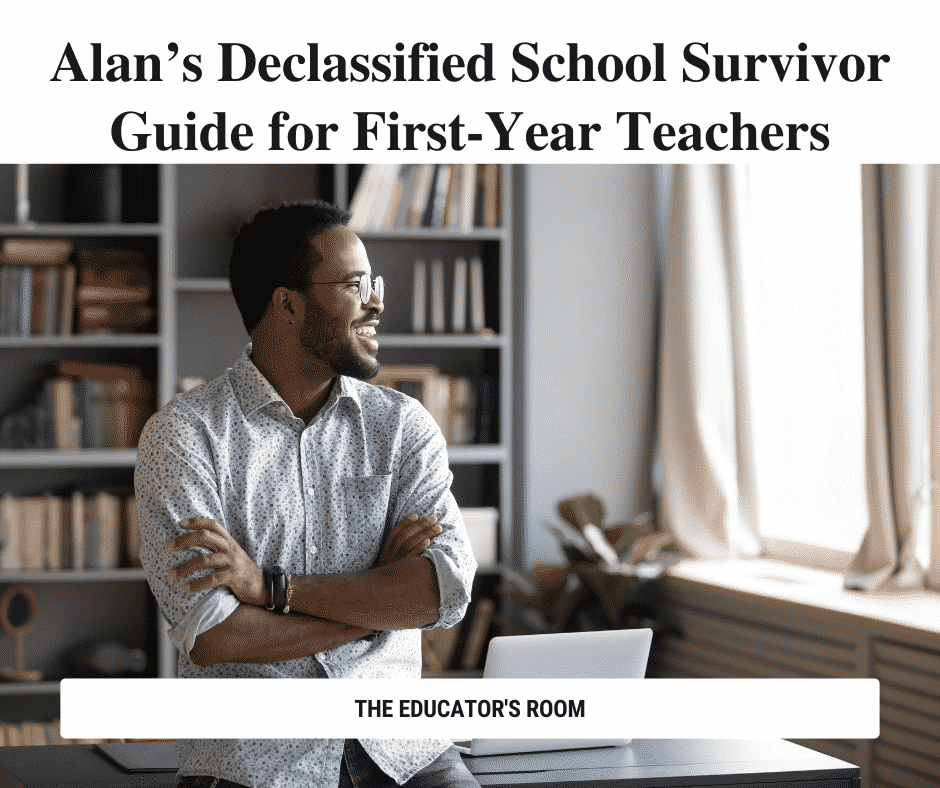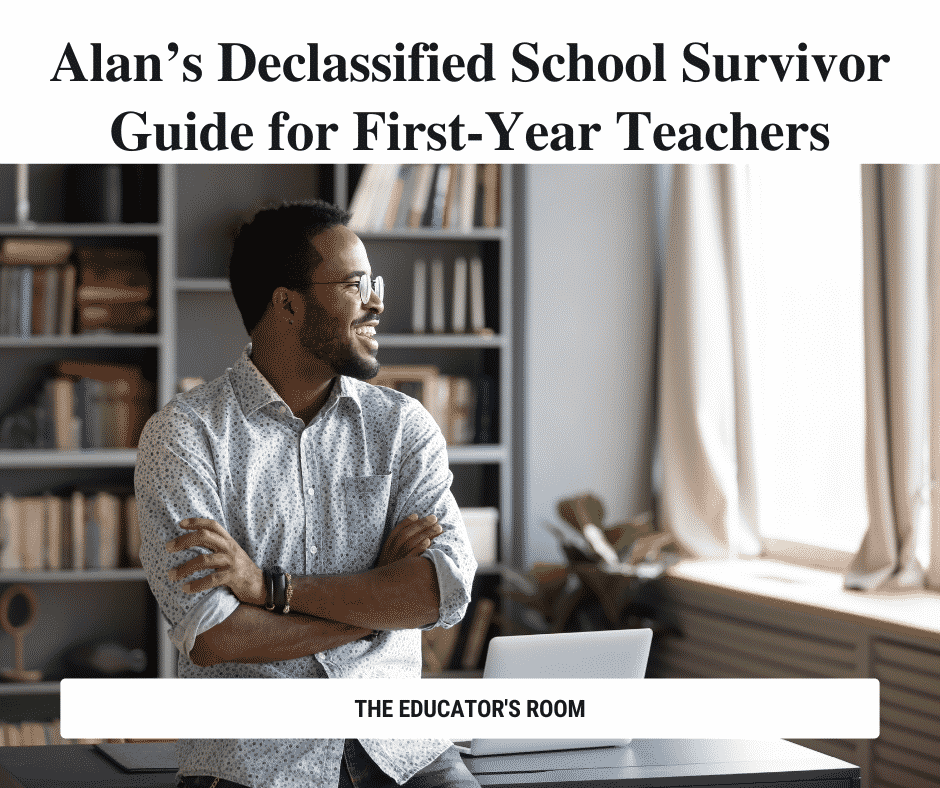Alan Jimenez is a first-grade teacher from Southeast Texas. He is currently planning to pursue a Master of Science in Curriculum and Instruction with a concentration in Early Childhood Education. His focus as an educator is to provide a well-balanced education for all his students, particularly those from impoverished homes or those who do not have the same access to education as their peers. In his free time, he enjoys reading and playing video games.
To say that the teaching profession is one of the hardest careers that someone could go into would be an understatement. Unless you aspire to become a teacher, have made the decision to enroll in a college to pursue a degree in education, or have heard tales from those in the education sphere, you may not know what a teacher really goes through. From grading assignments to state assessments, colleges only give students a preview into the teaching profession.
There are many things that first-year teachers and experienced educators wished they would have learned or discussed in college, but do not worry! If you are a current first-year teacher or are in the process of transitioning from a career in the outside world, then this is for you!
Relationships with Colleagues
In school, they teach us the value of building relationships with students. They tell us how building relationships with students can help teachers get to know them better, which in turn can lead to better classroom management, better behavior from students, but even more importantly, to real, authentic learning. In addition, while all of that is true, the thing they have never emphasized in colleges is the importance of building relationships with your colleagues.
The teaching profession is a wonderful and rewarding one, but it can also be lonely! You may think that you can do everything by yourself, but the reality is you cannot. There are so many things that teachers must deal with, many of them range from grades, deadlines, expectations from others, etc. (I would be taking more than one page if I listed everything that we deal with). And that’s not including our personal lives. So, having a support system, people in your school that you can go to for help, or even for a simple talk, can go a long way in making your first-year successful! Remember, relationships are everything! Have someone in your school; find your friend or person that you can always go to.
Parents
Similar to how there is not enough emphasis in colleges about building relationships with colleagues, the same can be said about building relationships with parents. We are not really taught how or why building relationships with our student’s parents is so important, but, speaking from personal experience, having a working relationship with parents is extremely beneficial to our student’s growth. According to an article on the Early Learning Network by Susan M. Sheridan, “Positive connections between parents and teachers have been shown to improve children’s academic achievement, social competencies and emotional well-being. When parents and teachers work as partners, children do better in school and at home” (Sheridan, 2018).
The main reason that we need to build relationships with parents is because of the student. If they’re having trouble in class, with reading or math for example, or there is a behavior that is starting to develop, having an established and working partnership with parents will go a long way in helping the student be successful. You might be scratching your head and wondering, “How I can build relationships with my student’s parents?” but do not worry! The following are three easy ways that you can begin building relationships with the parents in your classroom:
- Establish communication. With apps like Remind or ClassDojo, there are a number of ways for you to communicate with parents. Even a simple phone call or email for parents who may not be tech-savvy is sufficient. Two things that you should be aware of though: (1) Make sure that you are consistent with the method that you use for communicating with parents and (2) Don’t make it a habit to only call parents about something negative (misbehaviors and things like that). Make it a part of your day to make positive phone calls, not just negative ones. Parents like to hear how well their child is doing in class. Even telling them how “Jimmy” was picking up trash that wasn’t his or “Jenna” got an 86 on her math CA can make their day. It can go a long way toward establishing a healthy relationship.
- Collaborate. If a parent comes to you with a concern, do not dismiss them. Talk to them and see how you both can work together to help the student.
- Reach out early. If the school year has not started and you have a list of students, try to reach out to ask parents questions, like “What is something you want me to know about Eric” or “What is something that you are concerned about Jimmy for this new school year?” By doing this, you are showing the parent that you care and are invested in the education of their child, and it helps in establishing a relationship with them.
Don’t drink that margarita yet!
You are probably thinking to yourself “Whhaaatttt?”, so let me put this into context for you. We all have stressful days, and after an especially hard one, we might get together with some colleagues or friends to distress and have some fun. While there is nothing with that, what we all need to be wary of is what we wear outside. Even outside of school, if you are wearing a spirit shirt or have your ID showing somewhere on you, you are not only representing your school but your district. Whatever you do can adversely affect not only them but also you. People are always watching. Be mindful of this, and just make the simple effort of changing your clothes and putting away your ID badge before you have some well-deserved fun.
Social Media
As social creatures, we often like to share what is going on in our lives. From our children graduating kindergarten to us getting our dream job, we want to show people the exciting things that are happening in our lives. But just like we need to be careful with what we wear on the outside (refer to Don’t drink that margarita yet!), we must take into consideration what we put out in our social media accounts. Believe it or not, many jobs, before they hire you, will ALWAYS look at your social media accounts to see if there is anything that would keep them from hiring you. Nobody wants to see pictures of you drinking at night (with the drink in your hand) fallen over on the floor or a video of you getting into fisticuffs with another person.
Things like that tell the individuals who are looking at your application that you are NOT a good fit for the position (especially if you want to work with children). Make the conscious effort of being careful about what you post on social media. If you wouldn’t show it to your mother, don’t show it to Facebook.
For those of us who have held some sort of job, and not just in teaching, how you communicate with colleagues and other individuals shows your professionalism. For students who have never send out an email, you may find yourself hitting your head against the wall when you see the entire message in the “To” section of the email. For students at the elementary level, this isn’t necessarily an issue, but if you are going to teach middle or high school, below are some resources that you can use with showing your students how to properly write an email:
- Biz Summers, a middle school Instructional Technology Coach, walks students through the different parts of an email and how to write one in her video titled “How to Write an Email for Middle and High School Students.
- An article by Lori Gracey has several tips for all school levels on suggestions for strategies that they could work on when they begin writing emails. It also includes how you could possibly approach teaching students how to write emails.
Self-Care, Burnout, and Boundaries
If there is one thing that you take away from this piece, please let it be the subject of self-care. Self-care be a hard thing for first-year teachers to do. You want to prove yourself to your colleagues and to your administrators, but more importantly, you want to do what is right for your kids. For some, this can mean getting to your school hours before everyone else, not including the custodians, and getting to the printer before everyone else, or staying late after school to get prepared for the next day. And while it’s important to have everything ready for your students, there is no need to sacrifice your health for it.
You do not need to get up at the crack of dawn and lose precious sleep that is so hard to come by. Rebecca Silverman, in her article titled “Health Risks of Not Enough Sleep: Why Z’s Matter” lists several health risks that can come from not getting sufficient sleep, such as increased weight gain, issues with attention, reaction time, and motor function, and changes in mood and mental health. The bottom line is this; do not sacrifice your sleep for the job.
Unfortunately, something that many educators fall prey to is taking their work home with them, and a lot of the time, this isn’t always something that we can avoid. From grading expository essays or end-of-unit projects and tests, we can’t always avoid taking our work home with us. And this is where the concept of setting boundaries can come into play (not just for taking our work home). While looming deadlines for grades are an important thing to keep in mind, something even more important than that is our sanity. Establishing boundaries, while not easy at first, can go a long way in keeping us sane. The following are just some easy ways that can help you set boundaries for yourself, so you don’t sacrifice your well-deserved time off school:
- Dedicate a day or two that you stay after school to grade assignments.
- If you must take work home to grade, make sure it’s something that can be quickly assessed and taken care of.
- Get to your campus 30 minutes before students have be there to get everything ready.
- Take some time after school to prepare for the next day (try to limit it to an hour if you must).
- Don’t look at emails when you’re at home. You can reply to it the next day.
- Avoid taking work home when possible!
Applying
It is time for you to begin applying for positions, but you’re not exactly sure what to put on your application and resume. While applications may differ from district to district, your resume will stay consistent as you apply to different schools. The following are some things that you may want to include in your resume and application:
- Highly qualified. If an application asks if you are highly qualified for the position, the answer is yes! You went to school and got a bachelor’s degree, you’re qualified for the position. If you are an alternative certified teacher, you are highly qualified! Just make sure to include the program that you completed or are about to complete.
- List all the certifications that you have attained. If you are in the process of testing for the certification and are confident that you will pass the exam, place an anticipated and month/year next to the certification in question.
- List any experience that you have working with children (or a closely related field).
- If your application is asking why are you applying for this position, please don’t write “Because I need a job.” Instead, explain why you got into the field or made a transition to it and why you are applying to that school.
- Proofread your resume and application. Nothing makes the eyes of the person looking at your application/resume dart away quicker than an assault on the English language.
- Research the school and district you are applying to. Make sure it’s the right fit for you.
- Lastly, honesty. Make sure that whatever you put down in the application/resume is true. People can see through lies, and if you put something down and it comes up during the interview process, you are going to regret it.
If I had all the time in the world, I would list out more things that I wished I had learned before my first year than the seven that are on this piece. Because the reality is that there are more things I wish I could place on this paper, and many of these I’m still experiencing and will experience well into the next school year. My goal is to give you some tips that will help your first year (and others) go smoothly.

Works Cited
Gracey, L. (2020, September 10). Email Writing for Students. TechNotes Blog. https://blog.tcea.org/writing-an-email-for-students/.
Sheridan, S. M. (2018, August 29). Establishing healthy parent-teacher relationships for early learning success. Early Learning Network. https://earlylearningnetwork.unl.edu/2018/08/29/parent-teacher-relationships/.
YouTube. (2020). How to Write an Email for Middle and High School Students. https://www.youtube.com/watch?app=desktop&v=E_r8teF43Gc.






